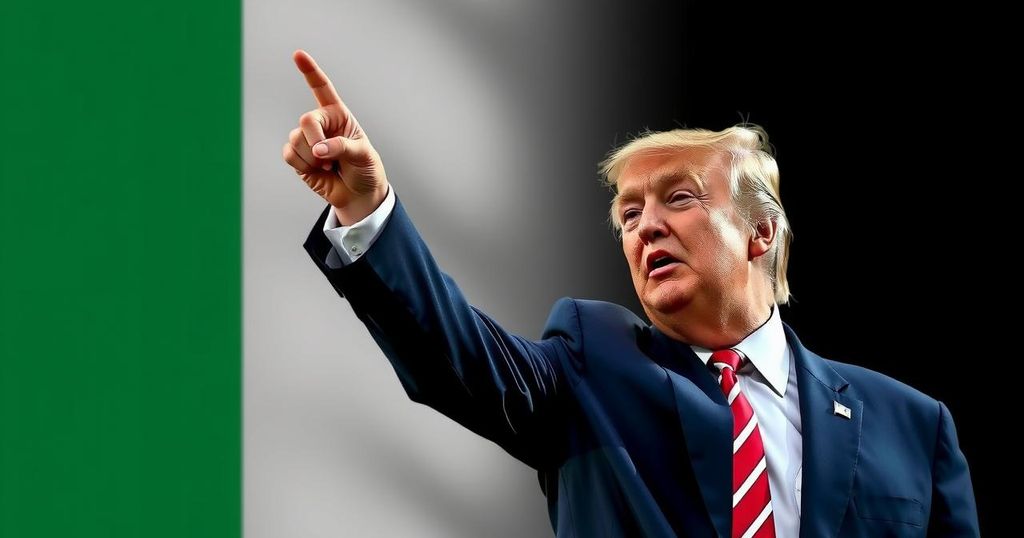Implications of Donald Trump’s Re-Election for Nigeria: A Comprehensive Analysis

Donald Trump’s election victory could reshape U.S. foreign policy towards Africa, particularly Nigeria. His “America First” agenda suggests less intervention and stricter immigration policies, prompting Nigerian leaders to consider the implications for bilateral relations and economic cooperation. Concerns about trade dynamics and limited support for LGBTQ+ rights reflect broader challenges that may arise under his administration.
Donald Trump has secured a historic second term as President of the United States, defeating Kamala Harris of the Democratic Party. In his victory speech offered in Florida, Trump proclaimed that the American public has granted him an “unprecedented and powerful mandate,” suggesting an optimistic future characterized as the “golden age of America”. This election result is expected to significantly alter US foreign policy, with Trump advocating for an agenda centered on non-interventionism and trade protectionism, coining the term “America First.” Analysts suggest that this shift could incentivize other countries, including Nigeria, to bolster their own funding, security, and support mechanisms. While African issues were not prominently featured in the presidential campaigns, there is considerable interest in how US foreign policy, particularly under Trump’s leadership, will affect the continent. Following Trump’s victory, African leaders, including Nigeria’s President Bola Tinubu, expressed anticipation of a strengthened relationship between Nigeria and the United States, focusing on economic cooperation and global challenges. During Trump’s initial term, his administration exhibited minimal engagement with Africa, marked by the controversial comment labeling several African nations as “shitholes.” This has raised questions about his commitment to the continent. However, analysts now hope that his next presidency may allow for enhancements in policies related to health, trade, and security for African nations. One area of concern for Nigeria would be counteracting Trump’s likely stringent immigration policies reminiscent of his first term, which may lead to increased deportations of undocumented migrants. As reported by Prof. Toba Alabi, a political science expert, undocumented Nigerians in the United States should prepare for possible adversities stemming from Trump’s immigration stance, as he has indicated that Africans should develop their home countries rather than migrate to the US. Furthermore, Trump’s victory is likely to create economic implications for Nigeria, as his views suggest that the interests of countries of the Global South often clash with those of the developed West. Analysts caution that Trump’s administration may not prioritize support for African economic development, viewing international financial institutions as extensions of Western influence rather than as genuine supporters of growth in developing nations. On trade, Trump has reiterated the use of tariffs as both a policy tool and a means to achieve international objectives, which could further complicate Nigeria’s trade dynamics with the US. Finally, while Trump has not prioritized LGBTQ+ rights, his historical statements suggest that there will be little support for progressive views on such issues during his administration, which aligns with Nigeria’s conservative norms regarding same-sex relations.
The article discusses the implications of Donald Trump’s recent election victory on Nigeria, particularly in relation to foreign policy, economic relations, immigration, and trade. With Trump’s focus on an “America First” doctrine, the potential for reduced engagement with African nations raises concerns about how these countries will adapt to a shifting international landscape. The historical context of Trump’s prior term and his controversial statements regarding Africa set the stage for analysis of his expected approach moving forward.
In conclusion, Donald Trump’s re-election presents several potential challenges and opportunities for Nigeria. His emphasis on non-interventionism and strict immigration policies raises concerns about Africa’s role in U.S. foreign policy and the prospects for bilateral relations. Additionally, the economic implications of his protectionist trade policies may further complicate Nigeria’s economic landscape. As Trump takes office, African nations, particularly Nigeria, must navigate these changes with strategic planning and adaptation.
Original Source: www.bbc.com






